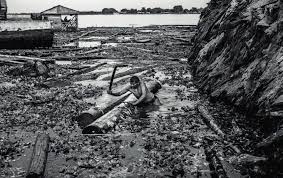Though Mr Zarate’s findings could fill scathing exposes of the kind churned out by Greenpeace, his technique is more like that of Svetlana Alexievich, the Belarusian writer who was awarded the Nobel prize for literature in 2015. A quote from one of her books stands as the epigraph to “Wars of the Interior”: “I strive desperately to…reduce history to the human being.” Like Ms Alexievich’s narratives, Mr Zárate’s relies heavily on his subjects’ own words. Like her, he focuses on the failure of the state to protect its people.
盡管扎拉特的調查結果可能填補綠色和平組織之前揭露的大量殘酷丑聞,但他的寫作手法更像是2015年獲得諾貝爾文學獎的白俄羅斯作家斯維特拉娜·阿列克謝耶維奇。扎拉特引用了她某本書中的一句名言作為《林內戰爭》的題詞:“我拼命努力……為人類還原歷史。”與阿列克謝耶維奇女士的小說很像的是,扎拉特的作品在很大程度上依賴于主人公自己的話。扎拉特與阿列克謝耶維奇都關注著是國家在保護人民上的失敗。

In Peru extraction companies operate in 70% of the rainforest. Many ignore clauses in their contracts about respecting local people but few are held to account. Though the World Bank estimates that 80% of Peru’s wood exports have illegal origins, only a handful of loggers have ever been sent to prison for illegally felling trees. In the past decade, meanwhile, more than two Olympic swimming pools-worth of oil has leaked into the country ’s rivers. Mr Zarate forces readers to confront the human implications of development. “Osman Cunachi doesn’t understand much about environmental politics,” he writes (in Annie McDermott’s translation), “but he does know how hard it is to clean oil off your body.”
秘魯70%的雨林都有開采公司在運作。許多公司無視合同中有關尊重當地人的條款,但很少有公司會擔負責任。盡管世界銀行估計,秘魯80%的木材出口都是非法來源,但只有少數伐木者因非法砍伐樹木而被送進監獄。與此同時,在過去的十年里,價值超過兩個奧運游泳池的石油已經泄漏到了秘魯河流中。扎拉特迫使讀者正視發展對人類的影響。扎拉特在書中寫道(安妮·麥克德莫特翻譯版本),“奧斯曼·庫尼亞奇對環境政治的了解不多,但他知道要清除身體上的石油有多困難。”
Economic development can no doubt be pursued more carefully, but its force seems to be unstoppable, just like the flood that destroyed the Amazonian village where Mr Zarate’s grandmother grew up in the 1940s. She left to work as a maid in Lima, as thousands of indigenous women still do each year. She married at 14, adapted her speech in order to assimilate into urban society and saved enough money to send all her children to university. To some, hers is an uplifting story. Mr Zarate isn’t so sure: “The question is what we are prepared to sacrifice, as individuals and as a society,” in the name of progress
毫無疑問,我們可以更加謹慎地追求經濟發展,但它的力量似乎是不可阻擋的,就像20世紀40年代摧毀亞馬孫村莊的洪水一樣,扎拉特的祖母就在那個亞馬孫村莊長大。她后來離開村子去利馬做女傭,現在每年仍有成千上萬的土著女性這樣做。扎拉特的祖母14歲就結婚了,她為了融入城市社會改掉了自己的方言,并攢了足夠的錢讓所有的孩子上大學。對某些人來說,她的故事令人振奮。扎拉特先生卻并不那么肯定:“其中的問題在于,我們身為個人和社會準備打著進步的名義去做哪些犧牲。”
譯文由可可原創,僅供學習交流使用,未經許可請勿轉載。











